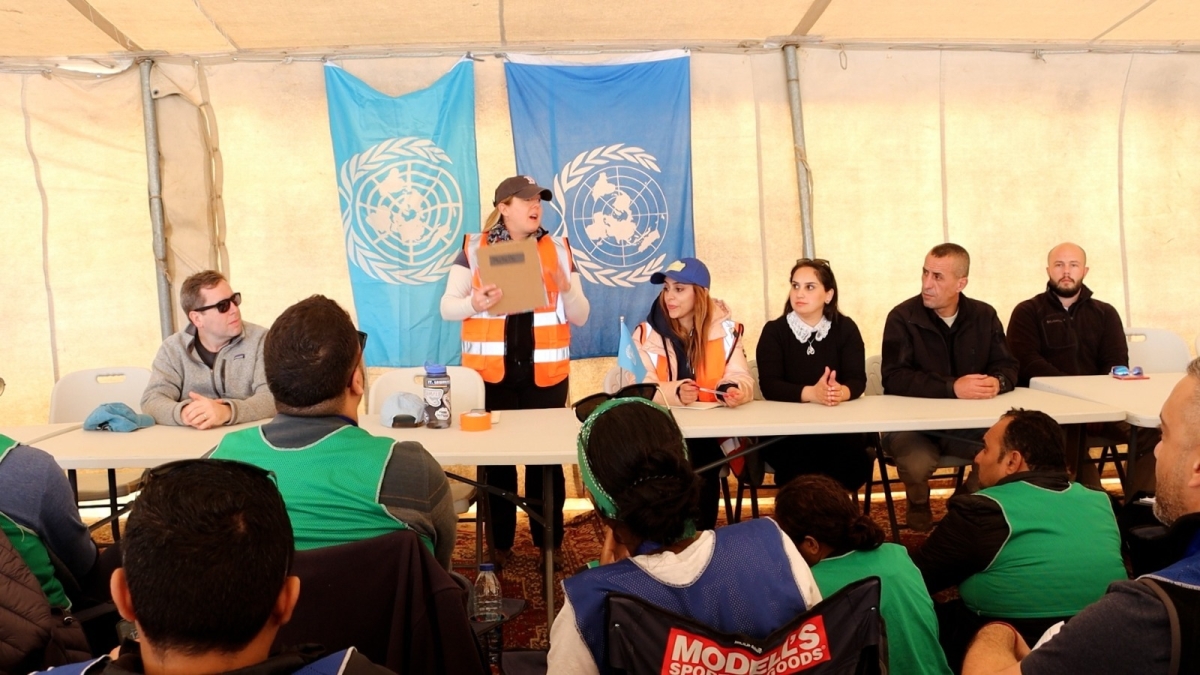- Local News
- Tue-2023-12-12 | 04:53 pm

Nayrouz News Agency : In line with the global initiatives and endeavors led by His Majesty King Abdullah II, the Supreme Commander of the Jordan Armed Forces-Arab Army, to establish trust and collaboration with international organizations and institutions, Jordan organized the regional multidisciplinary Humanitarian Response Simulation Exercise (IHRSE).
The main objective of this simulation is to equip prospective emergency leaders and trainees in Middle Eastern and African countries with the essential skills to adequately prepare for and respond to intricate humanitarian crises effectively and efficiently.
The exercise involved the participation of 65 individuals from 52 countries and non-governmental organizations in the Middle East and Africa. Additionally, it included 22 emergency specialists from Jordan representing the Ministry of Health, the Ministry of Interior, the Jordanian National Center for Epidemics and Communicable Diseases Control, and the National Center for Security and Crisis Management. Furthermore, over 100 volunteers took part, comprising university doctors from four Jordanian medical universities and five workers from the Palestine Red Crescent in the West Bank.
The exercise was carried out collaboratively by the World Health Organization's Regional Office in the Middle East and Africa and the Harvard Humanitarian Initiative at the King Abdullah II Special Operations Training Center (KASOTC) in Amman from December 3 to 12.
Dr. Samar Al-Mutawakel, the regional authority on emergency medical personnel, said: "This marks a significant occasion as the exercise is being conducted for the first time outside the United States of America, aiming to assist the humanitarian response in the regions of Africa and the Middle East, where the majority of crises occur globally. The countries in the Eastern Mediterranean region and Africa remain particularly susceptible to both existing and emerging emergencies. We take pride in contributing to the development of capacity among humanitarian responders in these regions."
Director General of KASOTC Na'el AlShqeirat stated that the favorable geopolitical location and the security and stability experienced by Jordan have created a conducive environment for the operations of humanitarian organizations.
These conditions support the training of personnel within these organizations, as well as their intended audience, in various training institutes and centers in Jordan, under the leadership of KASOTC, he added.
The main objective of this simulation is to equip prospective emergency leaders and trainees in Middle Eastern and African countries with the essential skills to adequately prepare for and respond to intricate humanitarian crises effectively and efficiently.
The exercise involved the participation of 65 individuals from 52 countries and non-governmental organizations in the Middle East and Africa. Additionally, it included 22 emergency specialists from Jordan representing the Ministry of Health, the Ministry of Interior, the Jordanian National Center for Epidemics and Communicable Diseases Control, and the National Center for Security and Crisis Management. Furthermore, over 100 volunteers took part, comprising university doctors from four Jordanian medical universities and five workers from the Palestine Red Crescent in the West Bank.
The exercise was carried out collaboratively by the World Health Organization's Regional Office in the Middle East and Africa and the Harvard Humanitarian Initiative at the King Abdullah II Special Operations Training Center (KASOTC) in Amman from December 3 to 12.
Dr. Samar Al-Mutawakel, the regional authority on emergency medical personnel, said: "This marks a significant occasion as the exercise is being conducted for the first time outside the United States of America, aiming to assist the humanitarian response in the regions of Africa and the Middle East, where the majority of crises occur globally. The countries in the Eastern Mediterranean region and Africa remain particularly susceptible to both existing and emerging emergencies. We take pride in contributing to the development of capacity among humanitarian responders in these regions."
Director General of KASOTC Na'el AlShqeirat stated that the favorable geopolitical location and the security and stability experienced by Jordan have created a conducive environment for the operations of humanitarian organizations.
These conditions support the training of personnel within these organizations, as well as their intended audience, in various training institutes and centers in Jordan, under the leadership of KASOTC, he added.










